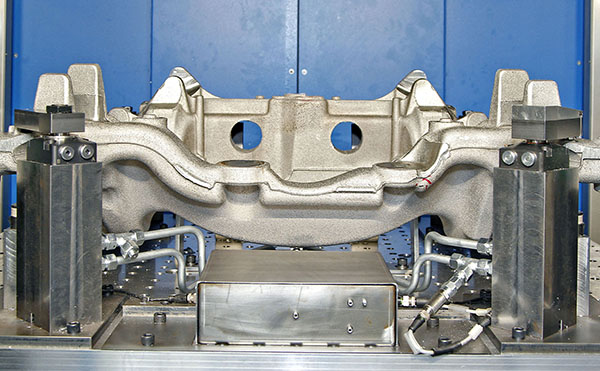
Two German firms, five-axis vertical machining centre manufacturer Wenzler (Heller group) and work-holding equipment specialist Roemheld, have developed a process that allows a casting or other component to be secured, while at the same time checking it for accuracy of form and position before machining starts. The solutions avoids adding value to defective workpieces that will later be scrapped, increasing process reliability, raising productivity and lowering manufacturing costs.
Wenzler conceived the idea as it wanted to offer customers, particularly those in the automotive industry, turnkey production centres for the reliable machining of aluminium chassis and suspension components, 24/7. The company’s technical manager Sebastian Knaus says: “We wondered how work-holding technology could contribute to making our customers’ production even more stable and efficient.”
Already familiar with Roemheld’s work-holding equipment, which he describes as “sophisticated, reliable, and sturdy”, he contacted the supplier’s key account manager Benjamin Nagel.
Development of the innovative clamping technology was based on a cast aluminium rear axle frame secured in a test fixture at Wenzler’s technical centre. The pilot phase ended in 2020 and this year it will find use assisting the series production of aluminium structural components at a German automotive supplier.
In more detail, the concept features swing clamps from Roemheld with integrated pressure sensors able to detect cost-effectively and easily the accuracy of the workpiece about to be machined. Intelligent clamping technology checks the parts for defects and contour variations, detects fixturing errors and provides information on the position of the component and the applied clamping forces during machining. Part quality is subject to continuous monitoring with seamless documentation.
For further information
www.roemheld.co.uk














